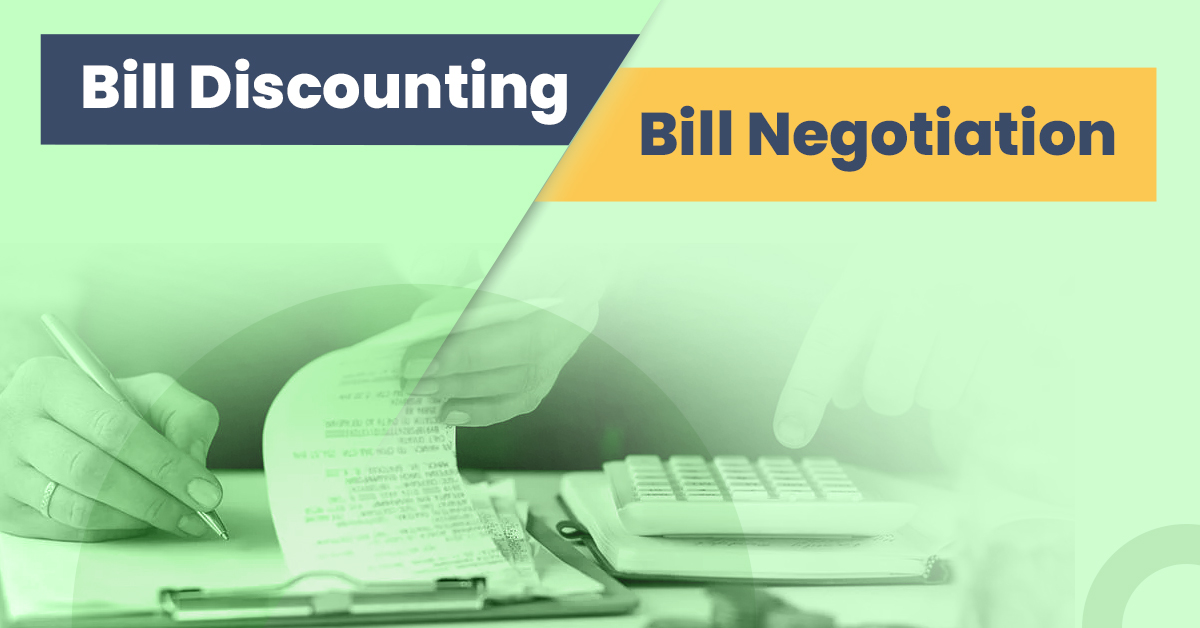The Difference between Bill Discounting vs Bill Negotiation


Are you a budding entrepreneur looking for financing methods to establish yourself in the business game? You will need to understand the concepts of Bill Discounting and Bill Negotiation to meet and subsequently exceed the competition. While you may find it easy to find customers, it might be a daunting task to receive timely payments from them. If your funds are tied up in unpaid invoices, two effective measures to release those funds are Bill Discounting and Bill Negotiation.
What is Bill discounting?
Let’s understand what Bill discounting is. If you as an entrepreneur are struggling with a liquidity crisis, then you can raise money against unpaid invoices. You will have to approach a Bill Discounting platform to raise funds against unpaid bills. The platform will issue funds at a discounted rate that is dependent on your business’s credit history, score, the counterparty against which the invoice has been raised, etc. Bills with good credit scores can help you in raising funds up to 80%-90% of the invoice amount.
Let us take an example of Company A that sold goods worth Rs. 10,000 to Company X. Now Company X agreed to pay the bills after 30 days of delivery. But, meanwhile if Company A needs money, they can sell this unpaid invoice to a Bill Discounting platform at a discounted price. The platform may charge a 15% discount and issue Rs. 8,500 to Company A.
The process of disbursing the cash against invoices happens in 24 to 72 hours, depending on the lender. This can help you take care of the liquidity crisis as well as give you complete control over the company’s sales. The other important factor is the customer is not involved in Bill discounting as this happens in confidentiality between the supplier and lender.
The process of Bill Discounting
Bill Discounting can be availed by following the below-listed steps
- An entrepreneur/business owner raises an invoice against a service offered or goods supplied.
- If there appears an urgent need for cash, the unpaid invoices can be taken to a lender to avail bill discounting.
- In a couple of working days, the lender pays the cash against the unpaid invoices at a discounted rate.
- This empowers the entrepreneur/business owner to carry on with other businesses and not wait for realising of the invoices.
Eligibility criteria to avail Bill Discounting are as follows:
- Signed and registered contract along with the payment agreement between the service provider and the customer.
- A valid purchase order against the sales order from the customer.
- Customer’s commitment to payout the outstanding amount on a fixed date.
Benefits of Bill Discounting:
- Improves cash flow which in turns improves the business’s working capital
- No Security or guarantee required
- The seller can ensure confidentiality as the buyer is kept out of this setup.
- The documentation formalities are lenient as compared to availing traditional loans. Further, the funds are released quickly within 24-72 hours.
What is Bill Negotiation?
Through the aforementioned information, you learned about what bill discounting is. Similarly, this paragraph will lead you to the answer of “What is bill negotiation?” This process is generally available after shipment of goods and requires export-related documents. You can negotiate the bills with financial centres or banks. These financial institutions verify your documents, and the bill is settled after deducting the applicable charges from the bill amount.
The process of Bill Negotiation
Bill Negotiation can be availed by following the below-listed steps.
- Once the completed products are exported to the customer, the following documents should also be sent to the customer to receive the goods delivery.
- Invoice copy
- Bill of Lading
- Bill of Exchange
- Packing List
- Certificate of origin
- Quality certificate, etc.
- Once all your documents are ready, they will have to be submitted to the financial institutions or banks.
- The financial institution validates the documents against all the terms and conditions of the customer, including the rule of the land and negotiates the bill/invoice.
- If all the terms and conditions are full-filled, then the financial institution negotiates the bills.
- After this, the seller receives the invoice amount, minus the applicable charges deducted by the financial institution.
- Once the customer clears the Invoice, the financial institution collects the discounted amount after deducting the interest amount.
Benefits of Bill Negotiation
- Bill Negotiation is a much simpler process than availing regular working capital loans from a bank.
- From the bank/financial institution’s point of view, bill negotiation is less risky as it is backed by a Letter of Credit.
Bill Discounting vs. Bill Negotiation
Please find the below table for an easy understanding of Bill Negotiation vs. bill discounting.
| Bill Discounting | Bill Negotiation |
| The Bill Discounting process is simpler compared to Bill Negotiation | The Bill Negotiation process involves validating many predefined documents |
| The customer is not involved in Bill Discounting avoiding the external influence | The customer invoice amount is directed to the financial institution |
| Complete control over the sales ledger | There is no interference from the customer |
| Bill discounting is availed after the consignment is shipped | Bill Negotiation also happens after delivering the consignment |
| The Bill Discount can be availed without any collateral | There are many documents to be submitted to avail benefit. |
The above-mentioned points establish the clear difference between Bill Discounting and Bill Negotiation.
What is the better choice between Bill Discounting and Bill Negotiation?
Bill Discounting and Bill Negotiation are options available to ensure cash availability in a business, thus ensuring no liquid cash flow crisis.
- Bill Discounting is done in complete confidence; the customer is not involved in these transactions
- If you have a genuine trade transaction with less to no risk of non-payment, then you can choose Bill Discounting.
- Bill Negotiation is to be attached with a letter of Credit
- Bill Negotiation can be selected when the risk of non-payment is high.
- Bill Negotiation transaction is backed up by a letter of Credit.
Bottom Line
Bill Discounting and Bill Negotiation are two options available to enable the smooth flow of business. These options help businesses to have working capital always available to avoid any shortage of funds in managing the business. Choosing between Bill Discounting and Bill Negotiation will have to be chosen based on the circumstances and trade.
FAQs
What are the documents required for applying for bill discounting?
Following documents are required for bill discounting:
Request letter for bill discounting
Bill of Exchange
Delivery Challan
Packing list
Delivery invoice
Transport proof
What is the maximum limit of borrowing that can be requested over an invoice?
Depending on the company’s credit quality, it can get up to a maximum of 90% of funds in exchange of the total invoice amount.
Can we consider bill discounting as a type of loan?
Yes, Bill Discounting can be considered to be a type of loan as the discounting company provides the borrower with short-term funds against the bill, which have to be repaid on the due date.
Can I negotiate my invoice if my firm has a history of bad debts?
If a firm has a history of defaulters and bad debts, negotiating an invoice becomes tricky. Financing companies consider their risks before lending money to any business. If your firm is one that has a lot of failed payments, the financier will consider their risk and charge high interest over the loan or may even deny providing any loan against the invoices.
How long does it take for the discounted funds to reach the borrower in case of invoice discounting?
In case of invoice discounting, the borrowed funds reach the borrower in a matter of a couple of days.
Is the financing company responsible for chasing payments under invoice discounting?
No, under invoice discounting, the borrower is responsible for chasing payments from the customers and paying back the loan to the financing company. The financier does not have to worry about collecting delayed payments.




